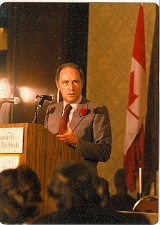
from April 20, 1968 to June 4, 1979, and again from March 3, 1980 to June 30, 1984.
Trudeau began his political career campaigning for socialist ideals, but he eventually joined the Liberal Party of Canada
when he entered federal politics in the 1960s.
I would have to point out in the strongest terms the autocracy of the Liberal structure and the cowardice of its members. I have never seen in all my examination of politics so degrading a spectacle as that of all these Liberals turning their coats in unison with their Chief, when they saw the chance to take power. ![]()
Bilingualism is not an imposition on the citizens. The citizens can go on speaking one language or six languages, or no languages if they so choose. Bilingualism is an imposition on the state and not the citizens.![]()
Vive le Franc libre.![]()
I'm not leaving! I must stay.![]()
Of course a bilingual state is more expensive than a unilingual one — but it is a richer state.![]()
If you want to see me again, don't bring signs saying "Trudeau is a pig" and don't bring signs that he hustles women, because I won't talk to you. I didn't get into politics to be insulted. And don't throw wheat at me either. If you don't stop that, I'll kick you right in the ass.![]()

